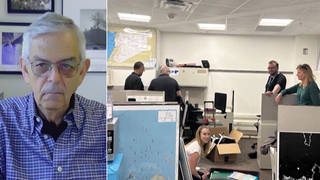
Guests
- Melvin "Ricky" Maclinworked at Republic Windows and Doors for almost a decade. He then worked at the successor, Serious Energy, for three years. He is one of 20 workers at New Era Windows Cooperative, a worker-owned company.
- Armando Roblesworked at Republic Windows and Doors for eight years. He then worked at the successor, Serious Energy, for another three years. He is one of 20 workers at New Era Windows Cooperative, a worker-owned company. He is president of Local 1110 of the United Electrical, Radio and Machine Workers of America in Chicago, a maintenance worker at the former Republic Windows and Doors factory.
- Brendan Martinpresident and founder of The Working World.
Workers at the New Era Windows Cooperative are celebrating the grand opening of their new unionized, worker-owned and -operated business. Almost a year to the day after their window factory closed, a group of former workers have launched their own window business without bosses. They successfully raised money to buy the factory collectively and run it democratically. In 2008, some of the workers were involved in a famous six-day sit-in after Republic Windows and Doors gave workers just three days’ notice before closing the factory. The sit-in drew national attention and union workers reached a settlement where they each received $6,000 each. About 65 workers occupied the factory after their jobs came under threat again in 2012. We speak to two worker-owners of the just-opened New Era Windows Cooperative and a labor organizer who helped with their fight.
Transcript
JUAN GONZÁLEZ: In labor news, we go now to Chicago. Workers at the New Era Windows Cooperative are celebrating the grand opening of their unionized, 100 percent worker-owned and -operated business. Almost a year to the day after their window factory closed, a group of former workers have launched their own window business without bosses. They successfully raised money to buy the factory collectively and run it democratically.
AMY GOODMAN: In 2008, some of the workers were involved in a famous six-day sit-in after Republic Windows and Doors gave workers just three days’ notice before closing the factory. The sit-in drew national attention. Union workers reached a settlement where they each received $6,000. The Goose Island plant, run by Serious Energy, faced a second occupation in 2012. About 65 workers occupied the factory in an attempt to save their jobs again. This is an excerpt of a documentary produced by the workers’ union, United Electrical, Radio and Machine Workers of America.
ROCIO PEREZ: [translated] They gave us like an hour, more or less. They came and said, “OK, you have your papers. Now go.” That is when we said, “No, we’re not leaving. This is where we’re staying.”
RON BENDER: So we decided—we just said, “Hey, we’re going to stay here until, you know, you all give us some better answers than this.”
FACTORY WORKERS: ¡Sí, se puede! ¡Sí, se puede!
CBS NEWS: This is a group ready for a fight.
MARK MEINSTER: We put it to a vote, and workers decided that they will be staying in the plant for the remainder of the weekend.
CBS NEWS: More than 200 of Republic Windows and Doors’ 300 union workers are staging a sit-in of sorts until they get what is legally owed to them. The union says company officials told employees they were closing shop because Bank of America would no longer extend Republic a line of credit. Bank of America wouldn’t confirm that, due to confidentiality concerns. Workers say the fact that Bank of America received $25 billion in the federal bailout makes this even more unacceptable.
ARMANDO ROBLES: I’m going to stay until the end. If they tell me I have to leave, well, they have to arrest me.
REPORTER: You’re prepared to be arrested?
ARMANDO ROBLES: I’m prepared to be arrested, if it’s necessary.
FACTORY WORKERS: ¡Y no nos vamos! ¡Aquí estamos y no nos vamos!
CBS NEWS: Translation: “We are here, and we are not going anywhere.”
MELVIN MACLIN: We have been here overnight. We’ve been here since yesterday, and we aren’t going anywhere. We are committed to this.
CBS NEWS: Melvin Maclin is one of dozens of Republic Windows and Doors workers who is staying put in the company’s cafeteria until he gets his remaining vacation, healthcare and severance pay.
FACTORY WORKERS: You got bailed out! We got sold out!
PRESIDENT-ELECT BARACK OBAMA: These workers, if they have earned these benefits and their pay, then these companies need to follow through on those commitments.
REV. JESSE JACKSON: Workers all around the nation who are now facing massive layoffs, it’s your job, it’s your plant. Stay there and fight for them ’til justice comes. And justice will come.
AMY GOODMAN: That last voice, Jesse Jackson, Reverend Jesse Jackson. Excerpts from a video produced by the workers’ union, United Electrical, Radio and Machine Workers of America. We’re joined now by two of the workers featured in that video, Armando Robles and Melvin “Ricky” Maclin. They join us now from Chicago, Illinois, along with the Brendan Martin, president and founder of The Working World.
JUAN GONZÁLEZ: Armando Robles worked at Republic Windows and Doors for eight years. He then worked at the successor, Serious company, for another three years. He is one of 20 workers at New Era Windows Cooperative, a worker-owned company. Armando is also president of Local 1110 of the United Electrical, Radio and Machine Workers of America in Chicago, a maintenance worker at the former Republic Windows and Doors factory.
And Melvin “Ricky” Maclin worked at Republic Windows and Doors for almost a decade. He then worked at the successor, Serious company, for three years. He’s also one of the workers at the newly opened cooperative.
Welcome, all of you, to Democracy Now!
BRENDAN MARTIN: Thank you.
ARMANDO ROBLES: Thank you.
MELVIN MACLIN: Thank you.
BRENDAN MARTIN: Thanks for having us.
JUAN GONZÁLEZ: Armando, if we could start with you, the road you’ve traveled now, from the second closing now to reopening this cooperative, how did that come about?
ARMANDO ROBLES: It comes from an idea. The last time when I be on Democracy Now! in 2009, the first time, even though—I met Brendan Martin, which is on my left side. And then, after, we talked about creating a new—why we don’t make a cooperative? And it comes to—it sounds to me a great and a brilliant idea. But in that point, somebody was buying the Republic Windows and Doors machinery and—Serious Energy. But I was—in my mind, that, so when—and I told him, “You know what? Owners are owners, and they close factories. And we never know when this person is going to close the factory.” This guy close, and we never [inaudible] to call Brendan Martin, take the offer and put the project in process. And at this point, it’s a great day for us. We’re going to open our cooperative. It’s called New Era Windows. And I’m really, really happy. It’s a lot of work we made. It’s a lot of learning process. But at this point, we have the factory now open.
AMY GOODMAN: Brendan Martin, talk about exactly what you did, how this new cooperative got organized.
BRENDAN MARTIN: Well, I came off of working in Argentina for about nine years with factories in a similar situation. They were closed down, and workers took them over and began running them. So then I met Armando Robles in New York in 2009 and mentioned this history to him. And he thought, “Wow! That seems kind of—that would be good.” And then, three years later, in 2012, he and some of the other workers called up and said, “OK, remember that co-op idea? What if we—can we really make that happen?” And I said, “I’ve seen it happen before. Why not?” So I flew out to Chicago. We began talking about what it would mean to form a cooperative. And we began raising the money for the workers to buy the plant for themselves.
JUAN GONZÁLEZ: And, Ricky Maclin, after the first protest—and I remember being there in 2008 covering that when you all sat in—and then the second—the reopening and then the second closing—how did you feel in terms of the prospects for this factory being able to continue?
MELVIN MACLIN: After Serious had bought the old Republic plant?
JUAN GONZÁLEZ: Yes.
BRENDAN MARTIN: After they closed down the second time.
MELVIN MACLIN: After they closed down the second time, then Armando and I, we had been having a conversation, and we were discussing the possibility. And that’s where that it really started for me. I thought that it may could work. And we both said, “Well, we have to give it a shot.” I mean, because at that time, I believe, I was like 58 years old. So, at 58, I can’t just roll up into a ball and die, so I have to do something. And so, we decided to fight, what we do best. And I remember the slogan, “We win what we fight for.” So, we have been fighting for this plant, and today is really a beautiful day. Thank you.
AMY GOODMAN: So, Armando Robles, talk about what you’re going to make there. Talk about New Era, this New Era Windows Cooperative.
ARMANDO ROBLES: Could you repeat the question for me?
AMY GOODMAN: What are you making at the New Era Windows Cooperative? I mean, how do people get involved? What are the products you’re making?
ARMANDO ROBLES: We’re going to start making replacement windows, vinyl windows and commercial windows—it’s our goal—and for affordable price and a good-quality product for the workers. At the beginning of this, I think we, us, know how to make windows. But after all work done we have at this point, I learned so much in this year. We put a factory in place in all the right spots. Yesterday, we have our check from the city. They checked—the inspector, they inspect the whole building, and they approve us our job. So, not even do just windows, but we would like to make a New Era for the United States, helping people creating cooperatives and create our good-quality and affordable windows for the region and for the United States.
JUAN GONZÁLEZ: And, Brendan Martin, I would have to assume that the labor unions alone and labor union members could provide a steady demand for the products of the factory. Have you gotten any—any bites or orders yet from—pressed by other unions or other—or unionized workers?
BRENDAN MARTIN: We have actually gotten early interest in the windows from people in unions, from housing cooperatives, and just from people across the United States and in the Chicago area who support jobs being saved by their workers rather than destroyed by their owners. But without a doubt, we still need more support to come in. So, anybody out there—these are residential windows. Anyone who’s listening can buy them. They fit in anyone’s home. They’ll save you money on your energy bill and pay for themselves in a few years. So, please come to our website, newerawindows.com, participate in this project by buying some windows, and then go out and start your own cooperative. We do have a lot of interest from the community, but we need more of the community to pile in and make this happen.
AMY GOODMAN: Well, we want to thank you very much for being with us, and congratulations on opening day, Armando Robles and Ricky Maclin, workers at New Era Windows Cooperative, and Brendan Martin, president and founder of The Working World. As we move to our last segment—
BRENDAN MARTIN: Thank you, Amy.
ARMANDO ROBLES: Thank you, Amy.
AMY GOODMAN: Thanks so much.












Media Options